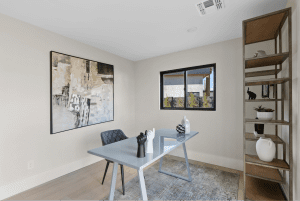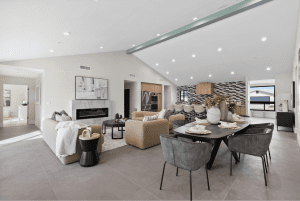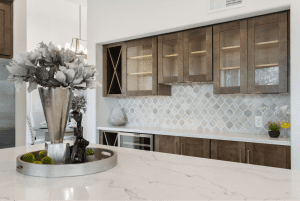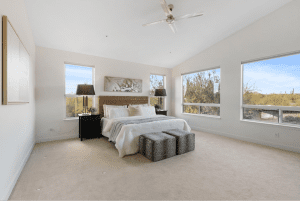Are you ready to make your house a dream for buyers so that you can sell it quickly for top dollar? Good to see you here at the best guide to home staging! In this in-depth piece, we’ll go over everything there is to know about home staging and give you insider tips that will help your property stand out in today’s challenging real estate market.
Why Home Staging Matters
A potential buyer is visiting a house for the first time. Entering the entrance door makes you feel welcome and comfortable. Beautiful, neutral design and abundant natural light make the sitting room airy. A gorgeous fruit dish is on the table, and all the kitchen appliances are clean and new. Soft bedding and tastefully chosen art make chambers cozy.
Setting up your home has that power. Make buyers feel connected to your property by staging it to sell faster and for more. The National Association of Realtors found that 82% of buyers’ agents stated staging helped their customers visualize a house as their home. Preparing your home for sale can boost its sale speed and profit.
The Psychology of Home Staging
How does house staging work? How individuals believe and feel matters. Buyers feel linked to a prepared property when they enter. Staging inspires purchasers to imagine living in your home.
Finding a house is more than just finding a building with four walls and a roof. You want a safe environment to relax, have fun, and make memories with family and friends. Staging your home makes it appear safe.
Remove clutter and personal items and arrange furniture smartly to make a house look like a blank canvas so purchasers may paint their own ideas on it. Buyers can imagine living in a well-designed room without the owners’ clutter. It’s like TV home design shows.
Key Elements of Successful Home Staging
What makes a well-staged home? Remember these important points:
Organize And Depersonalize
Decluttering and depersonalizing your area is important for staging. Having your personal items everywhere makes it hard for purchasers to envisage living in your home.
Start by clearing papers, bookcases, and worktops. Drop personal photos, collections, and taste-specific decor. Neutral spaces that appeal to a wide range of buyers are desired.
Display Your Home’s Best Features
Every home has special qualities. It may be a lovely fireplace, a large backyard, or a nice breakfast nook. Staging emphasizes these elements and makes them the room’s focal point.
If you have a great view, place your furnishings toward the windows to bring attention outside. Be sure to illuminate architectural features like exposed brick or coffered ceilings.

Solid color scheme
Color enhances house staging. The perfect color scheme may make your house feel warm, inviting, and large, while the wrong colors might make it feel old, claustrophobic, or unattractive.
Use neutral colors with splashes of color to stage your home. Avoid loud, vivid hues that may deter shoppers. Instead, choose relaxing colors like beige, gray, and pastel blue.
Update Your Lighting
Lighting can change the feel of your home, yet it’s often disregarded in home staging. Poor lighting makes your area feel dark, confined, and uninviting, whereas good lighting makes it feel warm, inviting, and open.
Stage your home with natural and artificial lighting in each room. Keep curtains and blinds open to let in natural light, and use lamps or overhead lighting to brighten dark corners.

Focus on Flow
The arrangement of your furnishings can affect how purchasers view your area. Guide buyers through your property, emphasizing its best aspects with a natural flow.
Declutter the space by removing superfluous furnishings. Next, arrange your remaining pieces to create passageways and conversation spots. Make sure there’s enough room for buyers to move around without running into any furniture.
Include Greenery
Plants give color and liveliness to a staged home easily. They make an area feel clean, inviting, and cared for.
Choose low-maintenance succulents, snake plants, or pothos for your staged home. Place them strategically on a coffee table, bookshelf, or kitchen counter.
Staging Room By Room
Let’s look more closely at how to stage each room in your home, now that we’ve talked about the most important parts of staging.
Living Room
When people come to look at your house, the living room is often the first room they see, so it’s important to shine. Clear out the room and remove any personal items first, then arrange the furniture to make a comfortable place to talk. For texture, add some throw pillows, blankets, and a few well-placed items like candles or books.

The kitchen
People often decide whether to buy a house based on the kitchen, which is the heart of the house. First, clean off your counters and get rid of any tools or other items you don’t use often. Then, clean your cabinets and appliances really well until they shine. Add some pretty things, like a vase of flowers or a bowl of fresh fruit.
Bedrooms
Your bedroom should feel like a cozy haven, so strive to make it a calm and welcoming space. Clear out the room and make it less personal first, then add some nice bedding and pillows. In the master bedroom, you might want to add a place to sit or some artistic items, like a tray with books and a candle.

Bathrooms
It can be hard to stage a bathroom, but you can do some easy things to make it feel like a spa. Clear off your counters and remove any personal things, like toothbrushes or makeup, to start. Next, add some soft white towels and some pretty things, like a candle or a plant. Finally, make sure everything is spotless.
DIY vs. Professional Staging
Consider whether to stage your home yourself or hire a professional. Both approaches have merits and cons.
DIY staging can be successful if you have a good design eye and are ready to work hard. Since you won’t need a professional stager, it may be cheaper. DIY staging is time-consuming and may not be as effective as professional staging.
Professional staging is a good investment if you want your property to look its best. Professional stagers know how to highlight your home’s best characteristics and connect with purchasers emotionally. They also sell high-quality furnishings and decor to make your home look like a model. Professional staging costs several hundred to many thousand dollars.
The Bottom Line
If you decide to stage your home yourself or hire an expert, it’s clear that it will help. Staging can help your home sell faster and for more money by making buyers feel connected to it and bringing out its best features.
If you’re going to sell your house soon, don’t forget how important it is to stage it. You can turn your house into a buyer’s dream and get the sale you’ve been hoping for with a little time, work, and creativity.
Frequently Asked Questions
House staging costs how much?
How much it costs to stage your home depends on its size, how much staging you need, and whether you hire a professional or do it yourself. Professional settings might cost $500–$5,000 or more.
How long does house staging take?
Staging your home takes time, depending on its size and whether you hire a specialist or do it yourself. Give yourself a few days to a week to clean, arrange, and get rid of garbage.
Do I get to stay in my house during staging?
You can live in your house while it’s being staged, but it may be challenging to keep it selling-ready. If possible, relocate out or stay with family or friends while the house is staged.
What if I can’t afford a professional stager?
You can stage your home without a professional if you can’t afford one. Use these tips and tricks. Eliminate clutter and highlight your home’s best characteristics with sensible furniture placement and décor.
How can I discover a reliable local home stager?
Ask your real estate agent or friends who recently sold their houses for recommendations on good home stagers. You may also search online for local home staging businesses and read reviews from previous clients.
Final Verdict
Finally, home decorating can significantly increase the speed and price of your home sale. Staging your property can boost sales by connecting with buyers emotionally and highlighting its best characteristics. This definitive guide has tips and methods to help you stage your home yourself or hire a specialist. Staging could be the key to selling your house soon!
